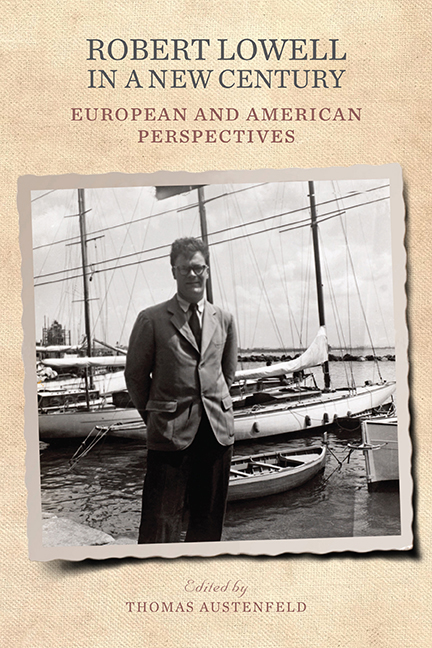Book contents
- Frontmatter
- Dedication
- Contents
- Acknowledgments
- Introduction
- 1 Revisiting Robert Lowell's Mental Hospital Poems
- 2 Sensual Drift and Ethnic Longing in Robert Lowell
- 3 Reworking the Same Water: Robert Lowell Transported
- 4 “Sweet salt embalms me”: A Hippocratic Approach to the Role of the Sea in the Poetry of Robert Lowell
- 5 More Delicate Than the Historian's Are the Map-Maker's Colors: Correspondences between Lowell's Poetics of History and Bishop's Poetics of Space
- 6 Robert Lowell and Ezra Pound's Economics
- 7 Robert Lowell and Ezra Pound in Washington and Rapallo
- 8 “Why Holland?”: Robert Lowell in Amsterdam
- 9 Lowell and Ungaretti: Imitations and Beyond
- 10 Robert Lowell's Credo
- 11 “Marriage? That's another story”: Reconsidering the Marital Trope in Robert Lowell's Poetry
- 12 “Oh No”/“Yes Yes”: Lowell and the Making of Mistakes
- 13 Robert Lowell: The Power of Influence
- Notes on Contributors
- Index
3 - Reworking the Same Water: Robert Lowell Transported
Published online by Cambridge University Press: 26 June 2019
- Frontmatter
- Dedication
- Contents
- Acknowledgments
- Introduction
- 1 Revisiting Robert Lowell's Mental Hospital Poems
- 2 Sensual Drift and Ethnic Longing in Robert Lowell
- 3 Reworking the Same Water: Robert Lowell Transported
- 4 “Sweet salt embalms me”: A Hippocratic Approach to the Role of the Sea in the Poetry of Robert Lowell
- 5 More Delicate Than the Historian's Are the Map-Maker's Colors: Correspondences between Lowell's Poetics of History and Bishop's Poetics of Space
- 6 Robert Lowell and Ezra Pound's Economics
- 7 Robert Lowell and Ezra Pound in Washington and Rapallo
- 8 “Why Holland?”: Robert Lowell in Amsterdam
- 9 Lowell and Ungaretti: Imitations and Beyond
- 10 Robert Lowell's Credo
- 11 “Marriage? That's another story”: Reconsidering the Marital Trope in Robert Lowell's Poetry
- 12 “Oh No”/“Yes Yes”: Lowell and the Making of Mistakes
- 13 Robert Lowell: The Power of Influence
- Notes on Contributors
- Index
Summary
ROBERT LOWELL WAS among the last of an august succession of American writers and artists to have traveled to the Old World by sea, and he was among the first to make subsequent journeys by air. He shares this distinction with just a small number of peers: Elizabeth Bishop, who first crossed on the SS Kӧnigstein in 1935 and later traveled by freighter to Brazil, but who thereafter flew across oceans and between continents; Anne Sexton, who sailed to Europe on the SS France in August 1963, in part in order to follow the route of her ancestors as detailed in her poem “Crossing the Atlantic,” but who took airplanes on subsequent trips; and John Updike, who sailed in 1954 but who thereafter became a frequent, if never very enthusiastic, flyer. Others of their generation, Sylvia Plath for example (see her 1960 poem, “On Deck”), sailed but never made the journey by plane. So accustomed are we now to transatlantic flight that we forget how sudden and how significant was the change from the old way of crossing to the new. And in so doing we risk overlooking the qualitative difference that this change made both to Lowell's experience and to the way he wrote about it.
The argument of this essay is that the shift from sea to air travel in the middle decades of the century—a rapid change by any account, but one that for Lowell, for reasons I'll explain below, was particularly compressed— opened up new perspectives, forms, and metaphors and served as an important catalyst for a renegotiation of his relationship with history (both national and familial), with place, and with his emergent model of selfhood. In his poems about his various crossings, I suggest, Lowell devises a new typology that is at one and the same time commensurate with his maritime inheritance and open to the potentiality of flight. Scholars including Robert von Hallberg and Jeffrey Gray have previously noted the significance of travel and tourism in the poetry of the post-war period, with an emphasis in von Hallberg's case on the economic, cultural, and political conditions that favored increasing mobility, and in Gray's on Lowell's deployment of travel, particularly in later life, as “subject matter for the poems.”
- Type
- Chapter
- Information
- Robert Lowell in a New CenturyEuropean and American Perspectives, pp. 40 - 53Publisher: Boydell & BrewerPrint publication year: 2019



